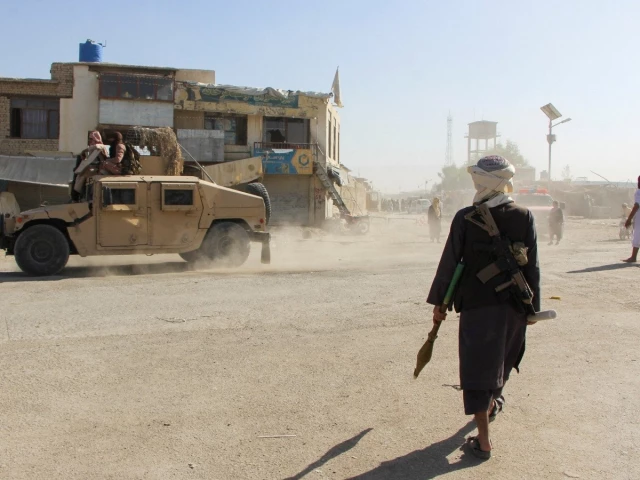Sources say next round of talks will continue on Sunday (today) to deliberate on cross-border coordination mechanisms
Afghan Taliban fighters patrol near the Afghanistan-Pakistan border in Spin Boldak, Kandahar Province in Afghanistan on October 15. Photo: Reuters
Pakistan has urged Afghanistan to dismantle terrorist sanctuaries, operating from Afghan soil, during Doha talks as first round of discussions concluded. The second session is scheduled for today (Sunday).
Pakistani delegation, led by Defence Minister Khawaja Asif including other senior officials. On the Afghan side, the talks were headed by Acting Defence Minister Mullah Yaqoob, accompanied by other representatives.
Pakistani officials raised the issue of cross-border terrorists attacks originating from Afghanistan, pointing in particular to groups such as the Gul Bahadur faction and the Tehreek-e-Taliban Pakistan (TTP). Islamabad maintains that these groups have been involved in multiple deadly incidents inside Pakistan in recent months.
Sources familiar with the talks said, Pakistan presented a ‘single-point agenda’ focused on the dismantling of terrorists networks. “Pakistan has made it clear that the Afghan government must eliminate terrorist organisations and their hideouts,” sources said.
The discussions mark one of the most direct diplomatic engagements between the two sides in recent months amid escalating tensions following a surge in attacks along the border regions. Sources said the next round of talks will continue tomorrow, with both sides expected to deliberate on security cooperation and cross-border coordination mechanisms.
Verified camps of Kharji Gul Bahadur targetted
Earlier, Information Minister Attaullah Tarar said Pakistan had carried out precision strikes on verified camps of the Kharji Gul Bahadur group along the Pak-Afghan border, killing around 60 to 70 Kharjis.
“Against Kharjis of the Gul Bahadur group, precision strikes were undertaken last night. In these strikes, a minimum of 60–70 Kharjis and their leadership have been sent to hell based on confirmed intelligence reports,” Tarar said in a post on X.
He said Pakistan targeted verified camps of the Kharji Gul Bahadur group located in border areas of North and South Waziristan districts along the Pak-Afghan border. During a 48-hour ceasefire, Kharjis operating from inside Afghanistan attempted to launch multiple terrorist attacks in Pakistan, which were effectively repelled by security forces.
Pakistan struck verified camps of Kharji Gul Bahadur in border areas of North and South Waziristan districts along Pak-Afghan border.
During 48 hours-long ceasefire, Kharjis operating from Afghanistan, attempted to launch multiple terrorists attacks inside Pakistan which were…— Attaullah Tarar (@TararAttaullah) October 18, 2025
“During the effective response by security forces, more than 100 Kharjis were sent to hell. Kharjis from the Gul Bahadur group also carried out a vehicle-borne IED attack in North Waziristan, in which civilians and a soldier embraced shahadat, while several others were injured,” he added.
Tarar dismisses reports of civilian casualties
Dismissing reports of civilian casualties as false and malicious, Tarar said, “All speculations and assertions regarding the targeting of civilians are false and aimed at generating support for terrorist groups operating from inside Afghanistan.”
“Pakistan sincerely believes that the way forward lies in resolving this complex issue of Indian-sponsored terrorism emanating from Afghan soil through dialogue and through the Afghan authorities’ control over non-state actors,” he said.
Tarar added that Pakistan reserves the right to safeguard its territorial integrity and protect the lives of its people. “We shall not allow terrorists operating from inside Afghanistan to live in peace,” he asserted.
Tensions escalated after unprovoked firing by Afghan Taliban regime
Tensions along the Pak-Afghan border escalated last week when clashes erupted after Afghan Taliban regime opened unprovoked fire at multiple locations in Khyber-Pakhtunkhwa (K-P) and Balochistan, prompting a swift and forceful response from the Pakistan Army, which destroyed several Afghan posts and killed dozens of Afghan soldiers and militants.
The coordinated assault originated across several key sectors, including Angoor Adda, Bajaur, Kurram, Dir, Chitral in Khyber-Pakhtunkhwa and Baramcha in Balochistan. The firing, security sources said, was aimed at facilitating the illegal entry of Khwarij — the state-designated term for the banned Tehreek-i-Taliban Pakistan (TTP) — into Pakistani territory.
“The Pakistan Army responded immediately and decisively,” security sources said. “The counteroffensive effectively targeted and destroyed multiple Afghan posts at border. Dozens of Afghan soldiers and Khwarij were killed in retaliatory fire.”
Over 200 Afghan Taliban killed
A day after Pakistan Army said its security forces killed more than 200 Afghan Taliban in overnight clashes along the Pak-Afghan border, while confirming that 23 of its soldiers were martyred during the crossfire, according to the military’s media wing, Inter-Services Public Relations.
According to an ISPR, the confrontation took place on the night of October 11–12, when Afghan Taliban forces, supported by “Indian-sponsored elements of Fitna al Khwarij,” launched an unprovoked attack on Pakistan along the border.
Read More: Over 200 Afghan troops killed
“The cowardly action, which included fire and a few physical raids, was aimed at destabilizing the border areas to facilitate terrorism, furthering FAK’s nefarious designs,” the statement said. Fitna al Khwarij is a term coined by the state for terrorists affiliated with the proscribed outfit Tehreek-e-Taliban Pakistan (TTP).
ISPR said that, exercising the right of self-defence, the alert Armed Forces of Pakistan repelled the assault decisively along the entire border and inflicted heavy casualties on Taliban forces and affiliated Khwarijs.
“Precision fires and strikes, as well as physical raids, were directed against Taliban camps and posts, terrorist training facilities, and support networks operating from Afghan territory, including elements linked to Fitna al Khwarij (FAK), Fitna al Hindustan (FAH), and ISKP/Daesh. All possible measures were taken to avoid collateral damage and to protect civilian lives,” the statement added.

